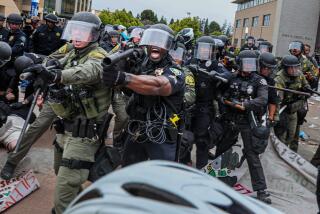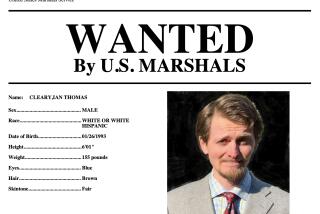Warrant Issued for Suspect in Hate E-Mail Case at UCI
- Share via
SANTA ANA — A former UC Irvine student was declared a fugitive Monday when he failed to show up for his arraignment in the nation’s first federal prosecution of hate crimes allegedly committed in cyberspace.
A federal magistrate issued an arrest warrant for 19-year-old Richard Machado of Irvine, who is facing 10 counts of civil rights violations for allegedly sending an anonymous computer message threatening to “hunt . . . down and kill “ Asians on campus. About 60 students received the Sept. 20 message.
Machado’s failure to show up for the arraignment adds an unexpected twist to an unusual case, among only a few prosecutions involving alleged cyberspace crimes and the first with hate as a motive, prosecutors said. College campuses have been at the center of a debate involving censorship of their computer networks.
Assistant U.S. Atty. Michael Gennaco said that before the Nov. 13 indictment, FBI agents had been in touch with Machado, but they did not consider him a flight risk.
Authorities, however, have been looking for him since Nov. 18, when an FBI agent showed up at Machado’s home with a court summons and was told by his roommate that Machado had stolen his car and left.
Gennaco said Machado left behind all of his personal possessions--except for his laptop computer.
Assistant UCI Police Chief Dennis Powers, who helped federal authorities with the investigation, said he thought “a subpoena would be appropriate [because] he’d been cooperating with us, returning my calls. And every time I tried to get hold of him, I always got him.”
After learning Machado had fled, Powers said, “I was amazed.”
The maximum sentence under the law is 10 years and a fine of $1 million. Under federal sentencing guidelines, however, he faces a likely sentence of two years if convicted on the misdemeanor charges.
The former UCI student might not face additional federal charges for absconding because he fled before he received official notice of the charges, Gennaco said. But he could face theft charges in state court if Irvine police determine he took his roommate’s car without permission, Gennaco said.
Machado had told investigators that he was born in El Salvador but became a naturalized U.S. citizen this year, said the prosecutor, who added that he hoped Machado had not fled the country.
The message, signed “Asian-hater,” sparked outrage at the campus, where last year 47% of the estimated 16,700 students were Asian American, the largest percentage of any UC school.
Machado accused Asians of being responsible for all crimes on campus, ordered them to leave the university and warned that he would personally kill them if they didn’t, according to the federal indictment.
Machado used a 24-hour computer lab in the university’s engineering building to send the message, though he was not an enrolled student, campus police said. Gennaco said most of the recipients were Asian Americans, including the suspect’s former roommate.
The grand jury indicted Machado on 10 counts of interference with a federally protected activity--for allegedly violating the students’ federal right to attend a public school and to be free from intimidation.
Legal experts said his indictment was almost certain to stir an ongoing debate about whether speech on a computer network should be held to the same legal standards as speech in any other medium.
H. Dean Steward, who heads the federal public defender’s office here and was in court Monday to represent Machado, described the case as “absolutely fascinating because it raises the whole issue of the thought police.”
“It’s one thing when you have someone who walks to a victim’s door and says, ‘I’m going to kill you,’ ” Steward said. “It gets more nebulous when you have someone sitting in front of a remote computer screen making a similar threat. You have to ask yourself whether this is a true threat.”
Machado has a mother, sister and brother living in Los Angeles, where he went to high school. The family is cooperating with authorities, police said.
Also contributing to this report was Times staff writer J.R. Moehringer.
More to Read
Sign up for Essential California
The most important California stories and recommendations in your inbox every morning.
You may occasionally receive promotional content from the Los Angeles Times.










